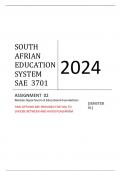SOUTH
AFRIAN
EDUCATION
SYSTEM 2024
SAE 3701
ASSIGNMENT 02
Module Department of Educational Foundations
[SEMSTER
TWO OPTIONS ARE PROVIDED FOR YOU TO 01]
CHOOSE BETWEEN AND AVOID PLAGIARISM
,SAE 3701
South African Education System : Year MODULE 2024
References: FOR OPTION 1
Moloi, T. (2011). Bodibeng High School: Black Consciousness Philosophy and Students Demonstration, 1940s–1976.
South African Historical Journal.
Taylor, N., & Vinjevold, P. (1999). Getting Learning Right: Report to the President's Education Initiative Research
Project. Juta and Company Ltd.
Jansen, J. D. (2009). Knowledge in the Blood: Confronting Race and the Apartheid Past. Stanford University Press.
Motala, S., & Dieltiens, V. (2004). Teachers, Ideology and the Role of Education in Society. Perspectives in
Education, 22(4), 83-95.
Nkomo, M. (2007). Challenging the Orthodoxies of Education in South Africa. Perspectives in Education, 25(2), 99-
109.
Bibliography:FOR OPTION 02
Moloi, T. (2011). Bodibeng High School: Black Consciousness Philosophy and Students Demonstration, 1940s–1976.
South African Historical Journal.
Mkhabela, Q. & Luthuli, P.C. (1997). Towards an African Philosophy of Education. Pretoria.
Higgs, P. & Smith, J. (2016). Philosophy of Education today: An introduction. Cape Town, Juta.
, Assignment 02
Moloi (2011) examines the influence of the Black consciousness philosophy on
both the teachers and learners at Bodibeng high school during the period 1940s
– 1970s. Write an essay to respond to the question: Does politics still have an
influence on teachers and learners in the democratic era? (50) Whether you
think there is still political influence or not, please remember to quote from the
sources you have used to justify your response. Consult Tshepo Moloi (2011)
Bodibeng High School: Black Consciousness Philosophy and Students
Demonstration, 1940s–1976, South African Historical Journal. Please note that
you are required to consult as many sources as possible to strengthen your
argument.
OPTION 01
The Influence of Politics on Teachers and Learners in the Democratic Era
Politics has been a pervasive force in shaping educational environments
throughout history. Tshepo Moloi's (2011) study on Bodibeng High School offers
valuable insights into how the Black consciousness philosophy influenced both
teachers and learners during the period of the 1940s to the 1970s. However, a
critical question arises: Does politics still exert its influence on teachers and
learners in the democratic era? To address this question, we must examine
contemporary sources and scholarly insights to assess the extent of political
influence in educational settings today.
In contemporary South Africa, the legacy of apartheid and the struggle for
democracy continue to resonate within the educational landscape. While the




